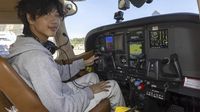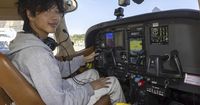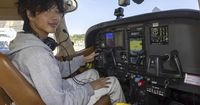What started as an ambitious journey to make history and raise money for childhood cancer research has turned into a months-long ordeal for American teen influencer Ethan Guo, who remains stranded in the icy expanse of the Chilean Antarctic. Guo, a 19-year-old pilot and social media figure who identifies as Asian American, set out to become the youngest person to fly solo to all seven continents while simultaneously collecting donations for cancer research. However, his daring mission took a dramatic turn in June 2025 when he landed his small Cessna 182Q plane without authorization on Chilean territory in Antarctica—a decision that has left him grounded ever since.
According to The Associated Press, Guo’s troubles began when Chilean authorities discovered that he had submitted false flight plan information. He had only been granted permission to fly over Punta Arenas, a southern Chilean city, but instead pressed further south, aiming for Antarctica. Prosecutors allege that Guo misled officials by providing “false flight plan data,” a move that triggered an investigation and criminal charges. On June 29, Guo was formally charged with handing false information to ground control and landing without official authorization.
The Cessna 182Q, known for its versatility and reliability among small aircraft, was Guo’s chosen vessel for this record-breaking journey. But the plane’s capabilities quickly came into question. Chilean prosecutor Cristián Crisoto told reporters that Guo’s plane “does not have the capabilities to make a flight,” though he declined to elaborate on the specifics. Despite this assessment, Guo has been consulting with his lawyer to explore whether there might still be a way for him to fly out of Antarctica and continue his mission.
For the past six weeks, Guo has been living at a Chilean military base. While he was not forced to remain at the base itself, he was required to stay within Chilean territory as the legal process unfolded. Severe winter weather in the southern hemisphere has made commercial flights out of the remote region scarce, leaving Guo with few options for departure. His own aircraft, grounded by both legal and technical constraints, has offered no escape.
Guo’s predicament has attracted widespread attention, not just for the high-profile nature of his journey but also for the unusual legal resolution that followed. On August 11, 2025, a Chilean judge dropped the charges against Guo as part of a negotiated agreement with his legal team and Chilean prosecutors. The deal requires Guo to donate $30,000 to a children’s cancer foundation within 30 days—a nod to the original charitable intent of his flight. In addition to the donation, Guo must leave Chilean territory as soon as conditions permit and is prohibited from reentering for the next three years.
In a text message to the Associated Press following the judge’s ruling, Guo expressed both relief and lingering anxiety: “I remain in Antarctica awaiting approval for my departure flight. I sincerely hope they give it to me soon so that I and my plane can continue with my original mission.” The sense of frustration was palpable, as Guo’s dream of completing his record-setting flight and raising funds for childhood cancer research remains on hold, subject to the whims of Antarctic weather and bureaucratic approval.
The agreement with the Chilean authorities also stipulates that Guo must pay all costs associated with his aircraft’s security and his own personal maintenance during his stay at the military facility. Additionally, he is responsible for covering all expenses related to his eventual return, whether by commercial flight or—should he receive clearance—by piloting his own Cessna.
The saga has raised questions about the risks and responsibilities of solo adventurers, especially those who leverage their journeys for social media fame and charitable causes. Guo’s attempt to become the youngest solo pilot to visit all seven continents was not just a personal quest; it was a highly publicized campaign that drew support from followers around the world. But as Chilean authorities have made clear, international regulations and local laws cannot be bypassed, even for good intentions.
“Relieved by the outcome,” Guo told AP after the judge’s decision, a sentiment that likely reflects both his gratitude for avoiding a protracted trial and his eagerness to move on. Still, the ordeal has come at a significant personal and financial cost. The $30,000 donation, the ban from Chilean territory, and the ongoing expenses of his extended stay in Antarctica are a steep price for a miscalculation that, in hindsight, might have been avoided with greater adherence to protocol.
From a broader perspective, the incident highlights the unique challenges of aviation in extreme environments. The Antarctic is among the most remote and inhospitable places on Earth, and even seasoned pilots must contend with unpredictable weather, limited resources, and strict international oversight. Guo’s story serves as a cautionary tale for other would-be adventurers, reminding them that the thrill of exploration must be balanced with careful planning and respect for local laws.
For Chilean officials, the case was a test of how to handle international visitors who flout regulations, even when their motives are philanthropic. Prosecutor Cristián Crisoto’s statement that Guo’s plane “does not have the capabilities to make a flight” underscores the seriousness with which authorities have approached the matter. There was no rush to expel Guo, but there was also no leniency for his unauthorized actions. The requirement that he fund a children’s cancer foundation is both a penalty and a gesture of goodwill, redirecting the narrative back to the cause that inspired Guo’s journey in the first place.
As of now, Guo remains in limbo, waiting for the Antarctic winter to loosen its grip and for officials to grant him permission to leave. Whether he will be able to fly his Cessna out or will have to arrange alternative transportation remains uncertain. What is clear is that his story has captivated audiences far beyond the aviation community, blending elements of adventure, legal drama, and human resilience.
Guo’s experience is a stark reminder that even the best intentions can lead to unforeseen consequences, especially when the rules of international travel and aviation are pushed to their limits. As he continues to wait for a resolution, his journey stands as both an inspiration and a warning to those who dream of making history in uncharted territories.



